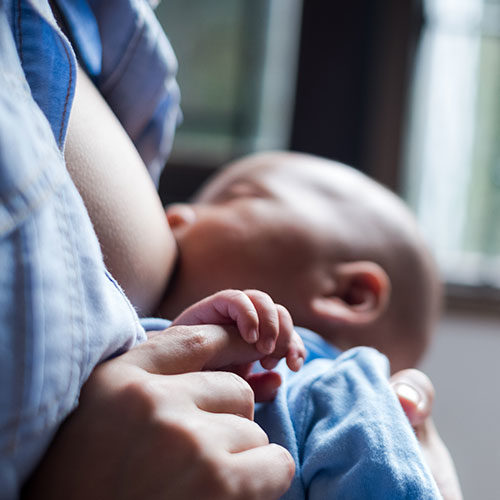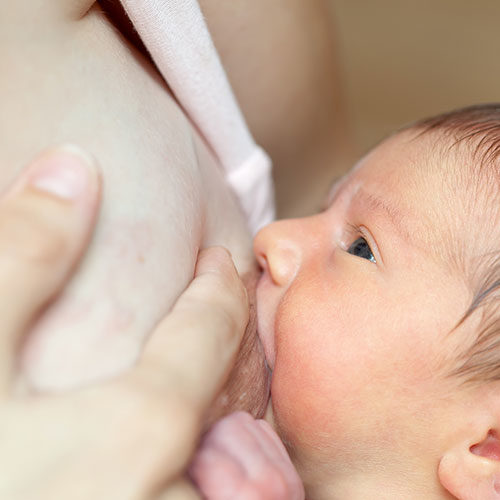How does milk production happen in the mother's body?
Milk production is controlled by 2 control systems.
- Hormonal Control
- Local Control
Hormonal Control :
Pregnancy changes hormones in a woman’s body and kicks start the process of milk production somewhere in the second trimester. When the baby is delivered, the mother’s body already has the milk (colostrum) for the baby. This milk is released due to the hormonal shift brought about by the delivery of the baby and placenta. Usually, the mature milk comes in within 2-3 days post-delivery. Until this stage, the milk production is controlled hormonally. So, if a mother’s concerned hormonal glands are working well, she will start making milk in the second trimester of her pregnancy and will have colostrum at birth. Her mature milk too will come in within 2-3 days of delivery. All this will happen irrespective of whether or not she is breastfeeding.
Local Control :
After the mature milk comes in, there is a switch from hormonal control to local control of milk production. This stage is also called the maintenance stage wherein the milk synthesis is controlled at the breast. Milk removal is the primary factor affecting milk production. This means that – if breastfeeding is taking place
- As per recommendation (10-12 times in 24 hours or more as per baby’s demand)
- With deep latch ensuring efficient milk transfer
The mother will make enough milk to meet the needs of her baby. This is how the milk supply is maintained and established.
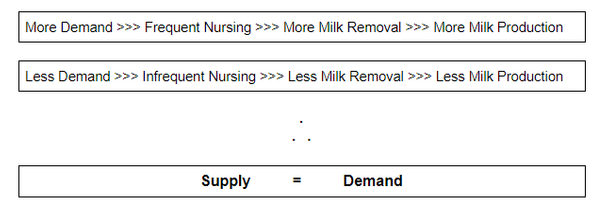
Hormones now have a very small role to play in milk production. However, hormonal issues can cause some imbalance in milk production in this stage too.
The communication between Breast and Brain :
When the baby breastfeeds, two things happen.
- Nipple stimulation
- Removal of milk
Lactation is maintained by regular removal of milk and stimulation of the nipple. When these two things occur, The nerves take the message to the brain to release the existing milk from the breast and make more milk. The brain releases oxytocin (the happy hormone) which ejects the milk as the letdown reflex. The brain also releases prolactin which is responsible for milk production.
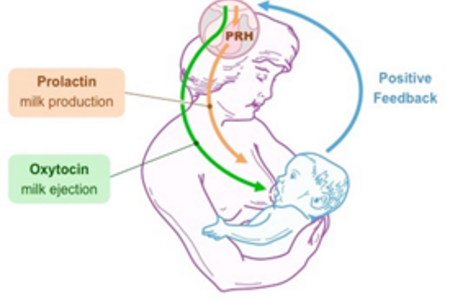
The Speed of Milk Production :
Research suggests that – Milk production is slower when the breasts are full and it is faster when the breasts are emptier. This perfectly explains why frequent and efficient milk removal from the breasts is so important in establishing, maintaining and increasing supply.

References :
Easy Breastfeeding by Camilla Conti
https://www.ncbi.nlm.nih.gov/books/NBK499981/
https://kellymom.com/hot-topics/milkproduction/
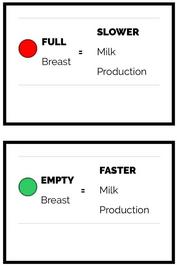
Wish to speak with a member of our team who is a certified lactation professional and also an experienced breastfeeding mother, click on this link.
Medical Advice Disclaimer
THIS WEBSITE DOES NOT PROVIDE MEDICAL ADVICE.
The information, including but not limited to, text, graphics, images and other material contained on this website are for informational purposes only. No material on this site is intended to be a substitute for professional medical advice, diagnosis or treatment. Always seek the advice of your physician or other qualified health care provider with any questions you may have regarding a medical condition or treatment before undertaking a new health care regimen, and never disregard professional medical advice or delay in seeking it because of something you have read on this website.
Disclaimer
We understand and acknowledge that parents and babies can be of various genders on a spectrum of LGBTQI+. Families come in diverse flavours. However, in our articles, for the sake of simplicity and convenience, we will be referring to the breastfeeding parent as the mother and using the female pronouns- ‘she’ and ‘her’ for babies. Babies can be nourished and nurtured in different ways and while we have used the terms breastfeeding and nursing, we recognize that parents can opt to chest feed or finger feed.
We don’t have conflicts of interest and declare, and we are compliant with the WHO code of marketing of breastmilk substitutes and the IMS act.
In case you find any information on this website that needs to be updated, please write to us at info@bsim.org.in



